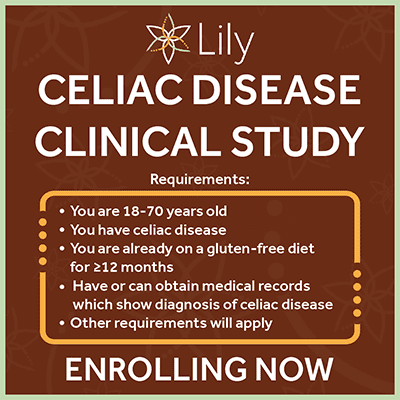Webinar Q&A with Stephanie M. Moleski, MD
March 21, 2013
Following the February 2013 webinar “Sex and the Celiac: A Focus of Reproductive Health,” NFCA worked with panelist Stephanie M. Moleski, MD, Assistant Professor of Medicine, Thomas Jefferson University Hospitals, to address the remaining questions from the live airing. The following guest post contains Dr. Moleski’s responses.
Question 1
Q. Is there gluten in other body fluids such as semen, urine, sweat, etc?
A. The only body fluid which has been shown to contain gluten has been breast milk. However, scientific studies are lacking for gluten in semen, urine, and sweat.
Question 2
Q. Since complete blood counts (CBCs) can be normal with low values for ferritin, iron, and other iron panel studies, should patients with celiac disease be given low dose iron supplement to get iron storage optimized before the hemoglobin drops? Should we treat this subclinical anemia?
A. Anemia is commonly found in patients with untreated celiac disease. When any patient is diagnosed with iron deficient anemia it is important that a thorough investigation is done for the etiology of the anemia. Anemia may be multifactorial caused by low iron intake (such as a vegetarian diet), inadequate absorption of iron from the gastrointestinal tract (as it is in celiac disease) and chronic blood loss. When patients with celiac disease are found to have iron deficient anemia it is still important to evaluate for other sources of anemia if there are risk factors. Patients with celiac disease and iron deficient anemia should be started on iron supplements under the direction of a physician. Due to potential side effects of iron supplements, such as nausea or constipation, it is not generally recommended to start a patient on iron unless they do in fact have an iron deficiency.
Question 3
Q. How long should a newly diagnosed woman wait to optimize her health with the gluten-free diet and nutrient support before attempting fertility treatment?
A. There is no clear time frame identified in which it is best to attempt pregnancy after a new diagnosis of celiac disease and initiation of a gluten-free diet. However, a case series by Nenna and colleagues looked at women seeking care at fertility clinics. Of these women, four had been diagnosed with celiac disease. All became pregnant within 2-9 months after initiating a gluten-free diet.
Source:
Nenna R, Mennini M, Petrarca L, Bonamico M. Immediate effect on fertility of a gluten-free diet in women with untreated coeliac disease. Gut. 2011 Jul;60(7):1023-4
Question 4
Q. Regarding male fertility, I understand that the more recent studies show no difference in the fertility of a male celiac disease patient before or after treatment by a gluten-free diet. However, wouldn’t severe malnutrition–a complication of long-term, untreated celiac disease — affect sperm count?
A. The most recent study by Zugna and colleagues on male infertility and celiac disease does not show a decrease in fertility in patients with celiac disease. However, earlier studies have shown that celiac disease is associated with androgen resistance, lower levels of dehydroepiandrosterone sulphate and reduced sperm motility. Characteristics of malabsorption in patients with untreated celiac disease, such as zinc deficiency and low levels of folic acid, may have adverse effect on fertility in males. More studies need to be done in this area before definitive conclusions can be made.
Source: Zugna D, Richiardi L, Akre O, Stephansson O, Ludvigsson JF. Celiac disease is not a risk factor for infertility in men. Fertil Steril. 2011 Apr;95(5):1709-13.
Question 5
Q. Have there been any studies with new mothers to determine a relationship of undiagnosed celiac disease causing low birth weight babies?
A. There have been studies looking at undiagnosed celiac disease and low birth weight babies. An Italian study by Salvatore and colleagues found that 1.60% of women with low birth weight babies had undiagnosed celiac disease, which was 2.25 times greater than women without celiac disease. In a large Danish population based cohort study, women with undiagnosed celiac disease had a higher risk of small for gestation age infants, very small for gestational age, and preterm birth when compared with women with a previous diagnosis of celiac disease. The authors assumed that women with a prior diagnosis of celiac disease were already on a gluten-free diet.
Sources: Salvatore S, Finazzi S, Radaelli G et al.: Prevalence of undiagnosed celiac disease in
the parents of preterm and/or small for gestational age infants. Am. J. Gastroenterol.
102, 168–173 (2007).
Khashan AS, Henriksen TB, Mortensen PB et al.: The impact of maternal celiac disease on birthweight and preterm birth: a Danish population-based cohort study. Hum. Reprod.
25(2), 528–534 (2010).
Question 6
Q. Can you discuss gluten sensitivity (not actual celiac disease) and any potential relationship to infertility? If one does not actually have celiac disease but believes they are gluten sensitive, could this be related to infertility?
A. There are studies showing that (non-celiac) gluten sensitivity exists and that many patients have similar symptoms such as GI complaints and fatigue. These studies have shown that that it is a separate disease entity from celiac disease. However, there are no studies looking at (non-celiac) gluten sensitivity and infertility.
Source:
Biesiekierski JR, Newnham ED, Irving PM, Barrett JS, Haines M, Doecke JD, Shepherd SJ, Muir JG, Gibson PR.
Gluten causes gastrointestinal symptoms in subjects without celiac disease: a double-blind randomized placebo-controlled trial.
Am J Gastroenterol. 2011 Mar;106(3):508-14.
Question 7
Q. As you referred to kissing, what about a spouse that eats high carb-containing foods and the impact on their semen? Can this cause vaginal reactions such as inflammation?
A. The only body fluid which has been shown to contain gluten has been breast milk. However, scientific studies are lacking for gluten in semen.
Question 8
Q. In the case study, the subject was pregnant within 10 months. Is there a certain time, such as a number of months, of being treated with the gluten-free diet that you see an increase in pregnancy rates?
A. There is no clear time frame identified in which it is best to attempt pregnancy after a new diagnosis of celiac disease and initiation of a gluten free diet. However, a case series by Nenna and colleagues looked at women seeking care at fertility clinics. Of these women, four had been diagnosed with celiac disease. All became pregnant within 2-9 months after initiating a gluten free diet.
Source: Nenna R, Mennini M, Petrarca L, Bonamico M. Immediate effect on fertility of a gluten-free diet in women with untreated coeliac disease. Gut. 2011 Jul;60(7):1023-4




